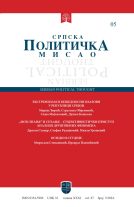- Home page
- Researchers
- Violeta Rašković Talović
Violeta Rašković Talović

US FOREIGN POLICY IN THE 21ST CENTURY AND THE QUESTION OF MORALITY IN INTERNATIONAL RELATIONS IN THEORY AND PRACTICE
The development of modern and powerful countries is conditioned by the need to possess and control significant amounts of resources. Out of the desire to increase the real power and influence of the global political plan, the great powers create conflicts, frictions and wars, neglecting the moral dimension and the negative consequences of the decisions taken. This paper aims to elaborate on the role of the great powers in triggering energy wars, focusing on the disguise of neo-imperial ambitions under the guise of fighting for human rights and democracy. With this in mind, the paper is divided into two parts. In the first part, the authors examine the phenomenon of war as well as the moral justification of wars by analyzing the ethical perspectives of war. In the second part, the authors’ attempts to explain how power and politics are put at the service of the ideological justification of decisions. The method of content analysis, the analysis of contemporary methods, and case studies are used as instruments to prove the hypotheses put forward. The author’s intention is to prove that energy and economic wars, which imply economic and political sanctions, are set in motion with the aim of destroying the economic potential of opposing economies and states that oppose certain geopolitical interests of the great powers. They turn the war for resources into a powerful weapon to assert their interests.

HATE SPEECH AS A FORM OF POLITICAL VIOLENCE
According to the conclusions of this paper, hate speech can be defined as a complex and indirect form of political violence. In this case, the complexity refers to the criterion of the number of participants and their mutual relationship, while according to the method of violence, an indirect relationship is apparent between the hate speech broadcasters and the subject against whom the violence is carried out. Hate speech is aimed to provoke intolerance, hate and violence, towards an individual citizen or a group of people, most often due to their ethnical, religious, sexual or political background, and to encourage and confirm such discriminating attitudes. Although just one segment of its common manifestations relates directly to the political views of the victim, hate speech is an expression of extreme political standpoints, and its motives can be defined as political. Predetermination of the victim of hate speech can be found in their specific individual characteristic, singularity or affiliation, as a personal peculiarity of that person or a group. Such characteristics, as a rule, differ from the usual, major and generally accepted social category or value, in other words, the wider culture’s main stream. Personal characteristic of a particular person is precisely what is of vital importance for defining hate speech, since the message expressed in hate speech is aimed directly to frighten, insult or degrade on the basis of race, ethnic, religion, language, gender, sexuality, political belief, social origin, or other personal characteristics of an individual. The genesis of hate speech is more about its recognition as such, rather than its specific occurrence and historical development. Throughout centuries, there has been a socially accepted practice, where the winners in war completely destroyed their enemies, as retribution or a severe kind for a “punishment for defeat”. In such circumstances, it is quite certain that hate speech practically existed, but was not condemned. The political ideology of hate-speech broadcasters is not especially significant, since it was practically used both by radical leftists and right-wingers. However, regardless of whether it is a “Jewpig” or “The enemies of the people” (in the case of Holocaust or Stalin’s purges), the impression is that hate speech is a second-degree crime. In periods of mass murders and similar cruel crimes, hate speech goes relatively unnoticed. Nevertheless, it is noticeable that uncontrolled hate speech serves as an announcement, that is, an introduction to a crime of much wider proportions.
